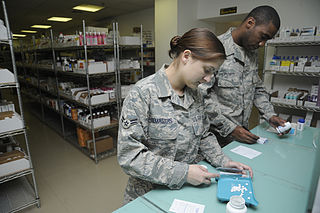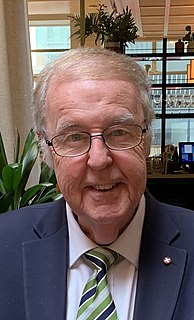
The UCL School of Pharmacy is the pharmacy school of University College London (UCL). The School forms part of UCL's Faculty of Life Sciences and is located in London, United Kingdom.

A pharmacy technician is a health care provider who performs pharmacy-related functions, working collaboratively with a licensed pharmacist. Training, certification, licensing, and actual practice of pharmacy technicians varies not only worldwide but in some countries regionally as well as by employer.

Chapman University is a private research university in Orange, California. It encompasses ten schools and colleges, including Fowler School of Engineering, Dodge College of Film and Media Arts, Fowler School of Law, and Schmid College of Science and Technology, and is classified among "R2: Doctoral Universities – High research activity". Although it does not claim to be a Christian college, it has had a relationship with the Disciples of Christ since the university's founding and with the United Church of Christ since 2011.
The Royal Pharmaceutical Society is the body responsible for the leadership and support of the pharmacy profession (pharmacists) within England, Scotland, and Wales. It was created along with the General Pharmaceutical Council (GPhC) in September 2010 when the previous Royal Pharmaceutical Society of Great Britain was split so that representative and regulatory functions of the pharmacy profession could be separated. Membership in society is not a prerequisite for engaging in practice as a pharmacist within the United Kingdom. It is not known how many pharmacists opted to join the Society. Its predecessor the Pharmaceutical Society of Great Britain was founded on 15 April 1841.
A Master of Mathematics degree is a specific advanced integrated Master's degree for courses in the field of mathematics.
The Doctor of Engineering, or Engineering Doctorate, is a degree awarded on the basis of advanced study and a practical project in the engineering and applied science for solving problems in the industry. In the United States, it is a terminal professional doctorate. A DEng/EngD is equivalent to a PhD in engineering, but different in that it has a solid industrial base and an additional taught element. The degree is usually aimed toward working professionals.
The Master of Sciences of Pharmacy (MPharm) is the standard master's degree program in Pharmacy. It is the oldest honorable Diploma (Degree) authorized from the European Faculties of Pharmacy as it takes five years to complete. It is based on a credit system higher than the normal Bachelor of Pharmacy degree. It is different from the American Pharmaceutical Diploma, Doctor of Pharmacy,(PharmD), that takes 4 years to complete. The Faculty is a member of the Association of European Faculties of Pharmacy and its graduates meet all the requirements for the profession as defined by the European Union. In the initial three years students revise and broaden their knowledge of elementary natural and medical subjects to the level required for understanding specific subjects from the field of Pharmacy. Students attend lectures and seminars and take part in practical pharmacy placements. During the last year of study they work on their thesis. The program is concluded by defending the thesis and taking the final state examination. Then the students are awarded the master's degree. The study program is compliant with EU directive 2005/36/EC. Graduates awarded the master's degree can later sit for a thorough state exam including an advanced thesis defense. After passing they are awarded the "Testing Board" degree. Graduates can apply for postgraduate after studying several branches of Pharmacy in the five accredited years. After defending their dissertation, submit their researches in their selected branches of Pharmacy and passing the final state examination they are awarded the degree. The master's program is offered in different specialized areas, one major being Clinical Pharmacy. Clinical pharmacy specialization enables pharmacists to deliver higher levels of clinical services. In some countries these specializations are happening with residency programs.
A Bachelor of Pharmacy is a undergraduate academic degree in the field of pharmacy. In many countries, this degree is a prerequisite for registration to practice as a pharmacist. Since both PharmB and PharmD are prerequisites to license in most western countries they're considered equivalent. In many western countries, the foreign graduates with BPharm, PharmB or BS Pharm practice similarly as PharmD graduates. It is analogous to MBBS vs. MD where MBBS is foreign equivalent of MD. It is training to understand the properties and impacts of medicines and developing the skills required to counsel patients about their use.

Triple accreditation in management education, also known as Triple Crown accreditation, is the combined business school accreditation of three major accreditation bodies: AACSB in the United States, AMBA in the United Kingdom, and EQUIS in the European Union. About 1% of business schools are triple-accredited.
Hopkins Architects is a prominent British architectural firm established by architects Sir Michael and Patricia, Lady Hopkins.

The University of Colorado Anschutz Medical Campus is the academic health sciences campus in Aurora, Colorado that houses the University of Colorado's six health sciences-related schools and colleges, including the University of Colorado School of Medicine, the CU Skaggs School of Pharmacy and Pharmaceutical Sciences, the CU College of Nursing, the University of Colorado School of Dental Medicine, and the Colorado School of Public Health, as well as the graduate school for various fields in the biological and biomedical sciences. The campus also includes the 184-acre (0.74 km2) Fitzsimons Innovation Community, UCHealth University of Colorado Hospital, Children's Hospital Colorado, the Rocky Mountain Regional Veterans Affairs hospital, and a residential/retail town center known as 21 Fitzsimons.
A Bachelor of Medical Sciences is an undergraduate academic degree involving study of a variety of disciplines related to human health leading to an in depth understanding of human biology and associated research skills such as study design, statistics and laboratory techniques. Such disciplines include biochemistry, cell biology, physiology, pharmacology or psychosocial aspects of health. It is an equivalent level qualification to the more commonly awarded Bachelor of Science (BSc). Graduates may enter a diverse range of roles including post-graduate study, higher education, the biotechnology industry, the pharmaceutical industry, consultancy roles, scientific communication, education or unrelated disciplines which make use of the broad range of transferable skills gained through this degree.
The Premier League is an English professional league for association football clubs. At the top of the English football league system, it is the country's primary football competition and is contested by 20 clubs. The competition was formed in February 1992 following the decision of clubs in the Football League First Division to break away from The Football League, in order to take advantage of a lucrative television rights deal.

Trevor Mervyn Jones, CBE PhD DSc (Hon) FRCP FMedSci FBPhS FRSM FRSC FLSW is a visiting professor at King's College London, and a former Head of R&D, at Wellcome. He continues to have a distinguished career in the pharmaceutical and biotech industry as well as in academia.
Aliasger K. Salem is the Associate Vice President for Research at the University of Iowa and Bighley Chair and Professor of Pharmaceutical Sciences at the University of Iowa College of Pharmacy. Salem's academic appointment at the University of Iowa is based in the College of Pharmacy, with additional secondary appointments in the College of Dentistry, Department of Chemical and Biochemical Engineering, Department of Biomedical Engineering, Department of Chemistry, and the Holden Comprehensive Cancer Center. Prior to joining the University of Iowa in 2004, he was a postdoctoral fellow at the Johns Hopkins School of Medicine and completed his PhD at the School of Pharmacy and Pharmaceutical Sciences at the University of Nottingham in the UK.
The 2016–17 EFL Championship was the first season of the EFL Championship under its current name, and the twenty-fifth season under its current league structure. Newcastle United were crowned the champions and were promoted to Premier League after just one season in the Championship. Brighton & Hove Albion, alongside Huddersfield Town, both achieved their first ever Premier League promotions, via the second automatic promotion place and play-off route respectively.

Harkishan Singh was Professor Emeritus at the Panjab University. He was a well recognized pharmaceutical academic, medicinal chemistry researcher and science historian. He had more than half a century experience in his respective fields to his credit. He worked at the Banaras Hindu University, University of Saugar, and the Panjab University in India, and abroad at the University of Maryland, University of Mississippi and the University of London.






